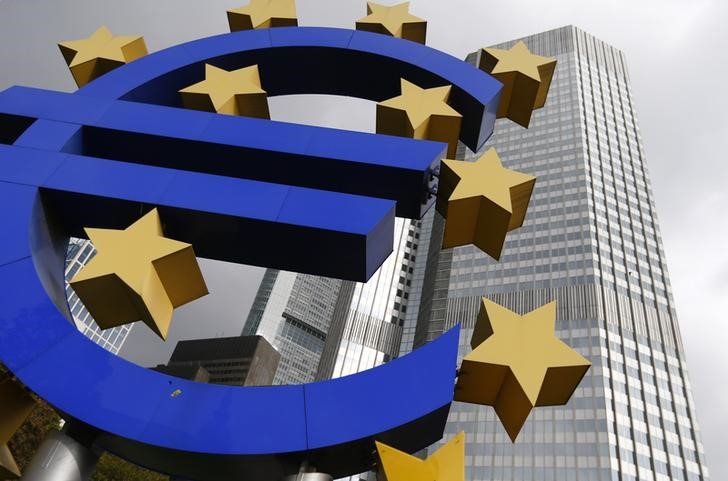By Paul Carrel
FRANKFURT (Reuters) - Banks are not expected to take up all the long-term European Central Bank loans offered on Thursday, increasing pressure on the ECB to begin buying sovereign bonds to hit a self-imposed stimulus target.
The ECB is offering banks the cheap, four-year loans as part of a package of measures to add around 1 trillion euros to its balance sheet - a goal it has set with a view to pumping money into the economy to save it from deflation.
At 0.3 percent, inflation is far below the ECB's target of just under 2 percent. Furthermore, a downgrade of Italy's sovereign debt rating last week and market jitters about Greece highlight the risk of the euro zone crisis flaring up again.
A big injection of cash with the so-called targeted long-term refinancing operation (TLTRO) would help the ECB on its way to achieving its 1 trillion-euro balance sheet target, but markets expect just the opposite.
A Reuters poll of money market traders on Monday pointed to banks taking 130 billion euros ($161.10 billion) on Thursday. They borrowed 82.6 billion in a first tranche in September and can take up to 400 billion in both rounds combined.
"A low take-up (on Thursday) clearly strengthens the rationale to adopt a broad-based asset-purchase programme, or QE," said Andrew Bosomworth, a senior portfolio manager at Pimco in Munich.
A modest start to the ECB's purchases of covered bonds and bundled loans known as asset-backed securities (ABS) -- the other components of its stimulus plan -- has already raised expectations the ECB will take more action early next year.
A Reuters poll on Wednesday showed growing worries that plunging oil prices will send the euro zone into a deflationary spiral. That could push the ECB to print money to buy sovereign debt early next year - a policy known as quantitative easing (QE).
ECB President Mario Draghi raised expectations when he said last Thursday that the central bank is headed for just such a step. The central bank will decide early next year whether to take further action to revive the euro zone economy, he said.
"There is a limit to which you can lead markets through forward guidance but not deliver on hints of additional measures," Bosomworth said. "At some point in time, markets will say 'enough!'
"When markets say 'enough', then some of the capital that has flowed into the southern euro zone markets in the recent past will begin to flow back out."

($1 = 0.8070 euros)
(Writing by Paul Carrel; Editing by Larry King)